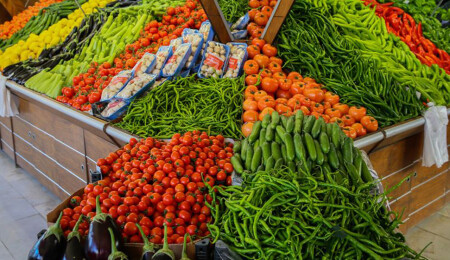Pesticide Residue in Local and Imported Produce Between 4% and 6%, Agriculture Department Reports

The Agriculture Department has revealed that pesticide residue levels in both locally grown and imported produce over the past five years ranged between 4.01% and 5.27% for domestic products and between 4.04% and 6.53% for imported ones.

In a statement, the department emphasized its commitment to food safety “from farm to fork,” highlighting that inspections in line with international standards are rigorously conducted from production through to consumption. Each year, between 2,500 and 3,750 samples are collected and analyzed at the State Laboratory for pesticide residues.
Samples from locally grown produce are collected directly from fields and orchards, and only those that test clean are approved for consumption. Imported fresh fruits and vegetables are sampled by agricultural inspection officers at entry points, with any products containing pesticide residues above legal limits denied entry into the country.
In cases where residue levels in domestic produce exceed permissible limits or unapproved chemicals are found, harvesting is delayed or products are destroyed. For imported goods, non-compliant batches are either destroyed or returned to the country of origin, based on the importer’s preference.
The department noted that the number of pesticide active ingredients screened at the State Laboratory has increased from 317 in 2020 to 617 as of March 20, 2025—an expansion aimed at ensuring maximum sensitivity in food safety.
Test results are shared weekly with the press and published on the department’s website and Facebook page. The department is also conducting educational outreach to producers and consumers in all regions to raise awareness about food safety.
Additionally, all agricultural chemicals imported into the TRNC are licensed by the Agricultural Chemicals Inspection Board, with permits issued for sale and usage. Import licenses are granted by the Agriculture Department following preliminary approval from the board’s registrar. Lists of banned or discontinued plant protection products are published on the department’s website. Guidelines for plant protection are regularly updated in line with the Turkish Ministry of Food, Agriculture and Livestock’s database and made publicly available online.












Yorumlar
Dikkat!
Suç teşkil edecek, yasadışı, tehditkar, rahatsız edici, hakaret ve küfür içeren, aşağılayıcı, küçük düşürücü, kaba, müstehcen, ahlaka aykırı, kişilik haklarına zarar verici ya da benzeri niteliklerde içeriklerden doğan her türlü mali, hukuki, cezai, idari sorumluluk içeriği gönderen Üye/Üyeler’e aittir.